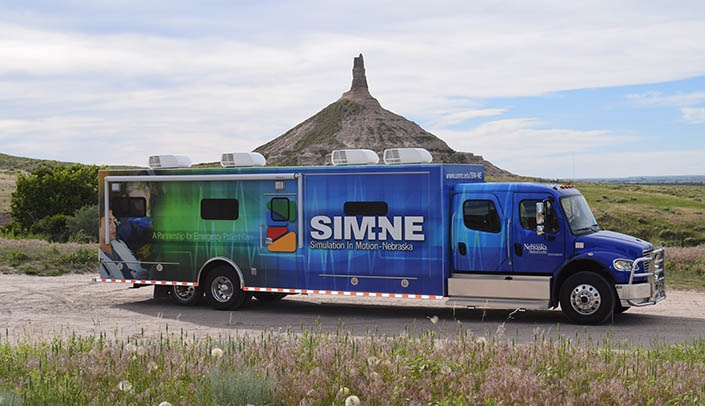With the 2020 Legislature back in session, one of the legislative bills that the University of Nebraska has endorsed is LB 761.
This bill, introduced by Sen. Myron Dorn of Adams, Nebraska, would support ongoing operational funding for the Simulation in Motion-Nebraska (SIM-NE) program. The program has trained nearly 7,000 individuals throughout the state, the majority of whom are volunteer emergency medical services (EMS) providers and rural firefighters.
On Monday, Jan. 27, UNMC’s Doug Dekker, simulation program manager for iEXCEL, and Ben Stobbe, assistant vice chancellor of clinical simulation for iEXCEL, will testify in support of LB 761 during a Transportation and Telecommunications Committee hearing. The hearing will take place Monday afternoon at the State Capitol.
LB 761 supports a 50-cent motor vehicle license fee increase to provide an appropriation from the Nebraska Emergency Medical Systems Operations Cash Fund to UNMC SIM-NE, allowing the program to continue offering high-fidelity simulation training to EMS and critical access hospitals at the current no-cost fee structure. The response from these recurring trainings has been overwhelmingly positive, Dekker said.
If this bill is of interest, university employees and students may consider reaching out to state senators, but must contact them on their own time and without using university resources (computers, telephones, letterhead or university accounts).
Find members of the Transportation and Telecommunications committee.
SIM-NE was initially funded by the Leona M. and Harry B. Helmsley Charitable Trust. Since its launch in January 2017, the four SIM-NE trucks collectively have:
- Traveled more than 62,000 miles across the state. That’s more than two-and-a-half times around the Earth;
- Provided more than 20,000 free continuing education training hours to volunteer EMS providers, firefighters and critical access hospital staff of Nebraska;
- Trained 6,953 individuals; and
- Trained at least one agency in 87 of Nebraska’s 93 counties.
Stationed in the Nebraska communities of Scottsbluff, Norfolk, Kearney and Lincoln, each mobile unit is equipped to recreate a realistic environment for learners including: medical supplies; pre-programmed computerized medical and trauma scenarios; monitors that display vital signs of patient simulators; heart monitors/defibrillators; audio and video recording/playback capabilities and mock drugs.
